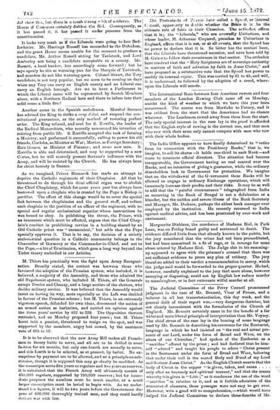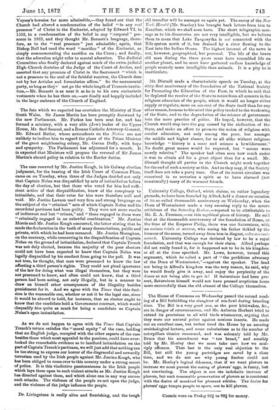The Judicial Committee of the Privy Council pronounced judgment in
the case of Mr. Bennett, Vicar of Froine, and a believer in all but transubstantiation, this day week, and the general drift of their report was,—very dangerous doctrine, but not clearly inconsistent with the formularies of the Church of England. Mr. Bennett certainly came in for the benefit of a far wideraud more liberal principle of interpretation than Mr. Voysey. The chief stress of the case lay in the bearing of some language used by Mr. Bennett in describing his reverence for the Eucharist, language in which he had insisted on "the real and actual pre- sence of our Lord, under the form of Bread and Wine, on the altars of our Churches ;" had spoken of the Eucharist as a " sacrifice " offered by the priest ; aud had declared that he him- self "adored" and taught his people to adore "Christ present in the Sacrament under the form of Bread and Wine, believing that under their veil is the sacred Body and Blood of my Lord and Saviour Jesus Christ." As the English Church asserts that the body of Christ in the supper "is given, taken, and eaten . . . . only after an heavenly and spiritual manner," and that the means whereby it is given is "faith ;" as it condemns the use of the word "sacrifice " in relation to it, and as it forbids adoration of the consecrated elements, these passages were not easy to get over. However, witb a good will to comprehension,—which would have helped the Judicial Committee to declare three-fourths of Mr.
Voysey's heresies far more—missible,—they found out that the Church had altered a condemnation of the belief "in any real presence" of Christ in the Eucharist, adopted by Edward VI. in 1552, to a condemnation of the belief in any " corporal " pre- sence in 1662, and they thought Mr. Bennett's language, there- fore, as to the "real presence" just admissible ; again, that Bishop Bull had used the word " sacrifice " of the Eucharist, as simply commemorating the sacrifice on the Cross ; and finally, that the adoration might refer to mental adoration. The Judicial Committee also finally declared against much of the extra-judicial High-Church doctrine of the Judge of the Court of Arches, and asserted that any presence of Christ in the Sacrament "which is not a presence to the soul of the faithful receiver, the Church does not by her Articles and formularies affirm." So the sacramental party, so long as thei-,- not go the whole length of Transub,tantia- tion,—Mr. Bennett is as near it as he is to his own eucharistic -vestments when he has them on,—are finally and happily included in the large embrace of the Church of England.



































 Previous page
Previous page